#achaemenid kings
Text
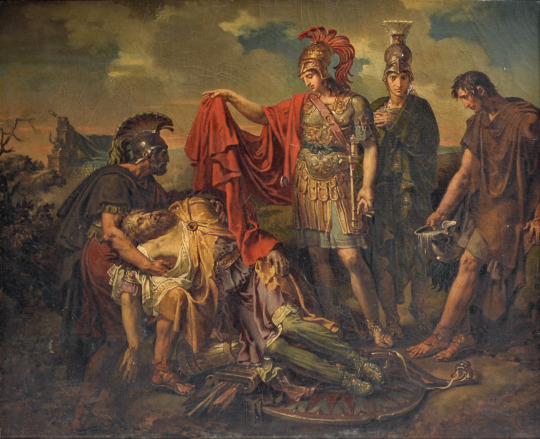
Alexander covering the body of Darius with his cloak
by Charles Meynier
#alexander the great#darius#art#charles meynier#antiquity#history#europe#european#asia#persia#persian#ancient greek#ancient greece#macedonian#macedonia#greek#greece#achaemenid empire#macedonian empire#king#persian empire
217 notes
·
View notes
Text
The fireplace:

This was actually an Achaemenid Persian lion with eagle wings. It was discovered for the first time in Hamadan(hegmataneh). During the Achaemenid period, it was one of the golden and royal vessels in which they drank in it. It's called "rhyton"
500 years BC



Also pictures are from the museum and not mine
What interesting things have you noticed in the movies?⚜️
#kingdom of heaven#baldwin iv#fandom#king baldwin iv#kingdom of heaven 2005#facts#art#history#ancient persia#ancient history#the leper king#fire place#decoration#history facts#achaemenid#movies
103 notes
·
View notes
Text

~ Clay bulla with impression of a stamp seal depicting the Persian king spearing a Greek hoplite.
Place of origin: Near Eastern, Iranian
Culture: Persian
Period: Achaemenid
Date: 550–331 B.C.
Medium: Clay
#ancient#ancient art#stamp seal#persian#persian king#king#greek hoplite#bulla#clay bulla#achaemenid#iran#iranian#near eastern#persia#550 b.c#331 b.c.#history#archeology#museum#war#battle
260 notes
·
View notes
Text
After a 13-year hiatus, the Prince of Persia game series is back in action, with a new game to be released in January. There is a new hero, Sargon, coming to the rescue of the prince. But is there a historic basis to the original ‘Prince of Persia’ character?
#Persia#Royal#King#prince#Rostam#ruler#Achaemenid Empire#Xerxes I#Naqsh-e Rustam#movie#film#ancient#history#ancient origins
16 notes
·
View notes
Note
Dr. Reames, I wanted to ask you, do you have a theory as to why Alexandros took Roshanak with him to war when she was pregnant? He also did the same with Estateira, but why, wouldn't it have been easier to leave them in a safe place and wait until the baby was born? Also, being pregnant, they would have also needed a midwife for when the baby was born and Roshanak should have had ladies-in-waiting and staff to take care of the baby, that's a lot of people, plus it would have added more pressure on the soldiers to protect the camp. Not to mention that there should have been an increase on food and control over it . I think Alexandros made it pretty complicated for himself.
By the time Alexander married Roxana, he’d begun his transition to King of Asia, and so borrowed a lot of Persian royal customs, including the tradition of a Royal Progress. Unlike Assyrian kings, who’d tended to hole up in their royal cities when they weren’t off to war, Persian kings toured their kingdom, keeping tabs on it. There were three/four “capitals” (Persepolis-Parsagadae, Susa, Ekbatana, and Babylon), in which the king took up residence for part of the year. But he sometimes traveled elsewhere, too.
Remember that ginormous tent Alexander captured after Issos? That was the king’s “mobile palace,” and the women’s tent was a moving harem. There was also a treasury, secretariat, etc. Think of it all like a tour bus, or—if you’re familiar with the weird US/Canadian habit of motorhomes—the really big ones that people drive the country in, sometimes year-round—that was the ancient equivalent. And the Persians had made a science of it.
Alexander simply latched onto that, as it fit quite well with his own foot-loose and fancy-free mode of rule. He didn’t like to be nailed down anyway, for any length of time.

Ergo, while, yes, there was a harem at the various palaces, it was not that unusual for the Great King’s chief wife and family to travel with him. That’s WHY Alexander wound up with Darius’s family after Issos. The Greeks (and later Romans) thought it was nuts, proof that Darius hadn’t taken Alexander seriously. But in fact, he’d taken him very seriously—so much so that he picked up his entire court and took it on the road to confront him.
If you’re curious about some of these customs, I recommend Lloyd Llewellen-Jones’s (2014) King and Court in Ancient Persia. He just came out with a general book on the Persians, but I prefer Maria Brosius’s A History of Ancient Persia. His earlier book, however, is good and written for a general audience.
So, in short, Alexander was merely doing what Persian kings had done before him by keeping Roxana with him. While in India, he does seem to have divided the base camp from the fighting army when fighting was imminent (as did the Persians: Darius’s staff, treasury, and the women had been left at Damascus while Darius himself went to chase down Alexander). And certainly, Alexander didn’t take the big stuff through Gedrosia. So, he definitely kept a sense of “danger” versus “leisure” travel.
But that’s why she remained with him when he was traveling on the kingdom outskirts. Once he returned to the Persian heartland, it’s less clear where the women were: whether in Susa (where the weddings occurred), or if they followed Alexander to Babylon and then Ekbatana (where Hephaistion died), and then back to Babylon. I’m betting they were taken to Babylon at least, as that seems to be where Alexander intended to make his new capital, in keeping with his “King of Asia” theme (as opposed to Great King of Persia ruling over Asia).
Hope that makes it a little clearer how the mobile court worked.
(I haven't forgotten your other question, but it's more complicated. Did a couple shorter.)
#asks#Achaemenid Persian Court#Alexander as King of Asia#Alexander the Great#Roxana#Persian royal customs#Mobile Persian court
15 notes
·
View notes
Text
Who Was Zoroaster and How Did He Gain Religious Followers? | Ancient Origins
https://www.ancient-origins.net/history-famous-people/who-was-zoroaster-and-how-did-he-gain-religious-followers-007684
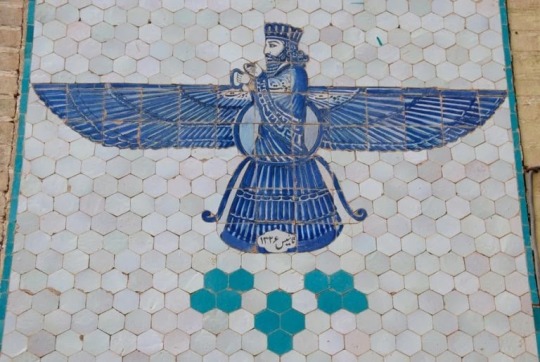
View On WordPress
#331 BC#6th century BC#Abrahamic Faiths#Achaemenids#Ahura Mazda#Alexander the Great#Amesha Spentas#Ancient Persia#Avesta#Avestan#Bactria#Bratrok-resh#Bundahishn#Central Asia#Christianity#Dughdova#Exorcisms#Fire Temple#Gathas#Greek#Holy Immortals#Hutosa#India#Iran#Islam#Judaism#King Vishtaspa#Kurdistan#Macedonia#Maidhyoimanha
0 notes
Note
Hello Neil. I hope you're doing all fine.
I'm from Iran. Iran always had such a glorious history. you have lots of fans in Iran and It would be such a great pleasure for all of us if you make a flashback in S3 where Aziraphale and Crowley are in ancient times of Iran. We have lots of stories you may find them interesting. For instance Cyrus the Great who was the king of the Achaemenid Empire, for the very first time, earned another empire without any war and violence.
It would be amazing if you have this in your mind too. Thank you so much.
With love by all of your Iranian fans.
PS/ Even if there is a reference to Iran's history, if there is a political problem, to show it fully, it is satisfactory for us. Thank you for your great mind
Iranian history is a wonderful thing. I'm glad that Crowley and Aziraphale have their supporters there, and if there's ever another chance to revisit their time in the past it would be great to see what they did in ancient Iran.
2K notes
·
View notes
Photo
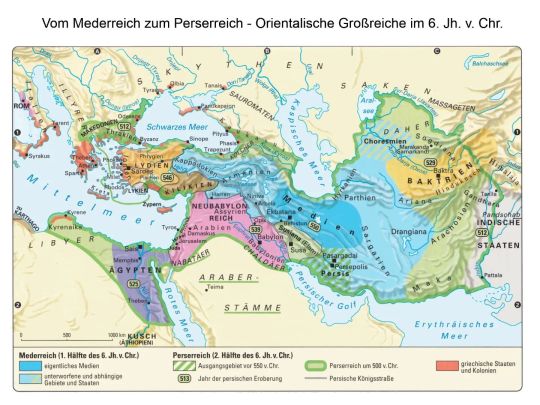
West Asian empires in the 6th century BC
“TaschenAtlas – Weltgeschichte”, Klett-Perthes Verlag, 2004
via cartesdhistoire
According to Herodotus ("Histories", Book I), Deioces became king of the Medes in 701 BCE in western Iran. He united the six Median tribes and repelled Assyria's influence from his capital, Ecbatana. His grandson Cyaxares destroyed the Assyrian Empire with the help of the Babylonians (612 BCE), and then they divided its remnants. Cyaxares also destroyed the kingdoms of the Mannaeans and Urartu and advanced into Asia Minor, where the Halys River became the border with Lydia (585 BCE). His son Astyages succumbed to the Persians in 550 BCE, and Media became a satrapy.
In western Media, Nabopolassar founded the Chaldean dynasty ruling over the Neo-Babylonian Empire (625-539 BCE). His son Nebuchadnezzar II (605-562 BCE) restored Babylonian greatness and built the Temple of Marduk (the biblical Tower of Babel) in his capital, as well as the fortifications known as the "Median Wall," palaces, and the Hanging Gardens (on terraces). In 539 BCE, the Persians seized Babylon.
Achaemenid Persian Cyrus II conquered the Median Empire, Lydia (546 BCE), Babylon (539 BCE), and the Greek cities of western Asia Minor, Bactria, and Sogdia (529 BCE). His son Cambyses II subjugated Egypt and the Greek cities of Cyrenaica (525 BCE). The Persians then adopted the Assyrian concept of an empire uniting all the peoples of the world under one great king ("King of Kings"). Darius I conquered the Indus Valley in 512 BCE and occupied Thrace and Macedonia (513 BCE).
The Assyrians and Chaldeans had already begun to politically and civilly unify much of the Middle East, and the Persians continued this tradition. Thus, Aramaic, already used as a language of communication, was adopted as the language of Persian administration.
Despite its power, the history of the Achaemenids is poorly known because the scribes used parchment or papyrus; apart from rare royal inscriptions, there are few accounts from reluctant subjects or passionate opponents.
73 notes
·
View notes
Text
Pub Quiz
People hated it when Mr Stevenson was in the pub during the pub quiz. He was an unpleasant, smug smart-ass. As a teacher at the exclusive public school, he definitely felt like something better. His greasy hair, shapeless figure and old-fashioned clothes did nothing to change that. Mr. Stevenson was simply an unsympathetic person in every respect. And that was why all the visitors to the pub had decided that something had to change. Something fundamental.
"Which ruler founded the Achaemenid dynasty?" asked the moderator of the quiz duel. And again, Mr. Stevenson answered smugly as well as recklessly, "Achaimenes, of course. Otherwise it wouldn't be the Achaemenids, would it?"
"Congratulations!" exclaimed the bartender. "There's a special prize for answering that question!" He handed Mr Stevenson a polo shirt. "Would you do us the pleasure of trying it on right away?"
Even more than showing other people how stupid they were, it pleased Mr Stevenson to get something for nothing. He had also been delighted to get his apple juice for free after the bartender had stained his already coffee-stained shirt while pouring it. Perhaps it was quite appropriate to put on a fresh polo shirt now.
Mr. Stevenson took the polo shirt without a thank you, went to the toilet, took off his shirt and put the polo shirt on over his old stained vest. But instead of the vest, there was suddenly a heavy silver chain. And the rest of his clothes changed too.
"'Can I take a piss right now,' Buck thought to himself. He unbuttoned his jeans and took his magnificent cock out of his jockstrap. On his way back to the bar he was annoyed that it was the pub quiz again. Then the pub was full of arrogant know-it-alls. He was here to have a beer and watch football. He was a caretaker at the community school and the captain of the local rugby team. He didn't need to know all that shit.

"What name was the King's grandmother known by," was the next question. "The Rottweiler?" wondered Buck. He had no idea. Hopefully the other lads from his rugby team would arrive soon, then they could at least enjoy the evening having a beer or two.
And again, a post by @stargazerguy was the motivation!
188 notes
·
View notes
Text
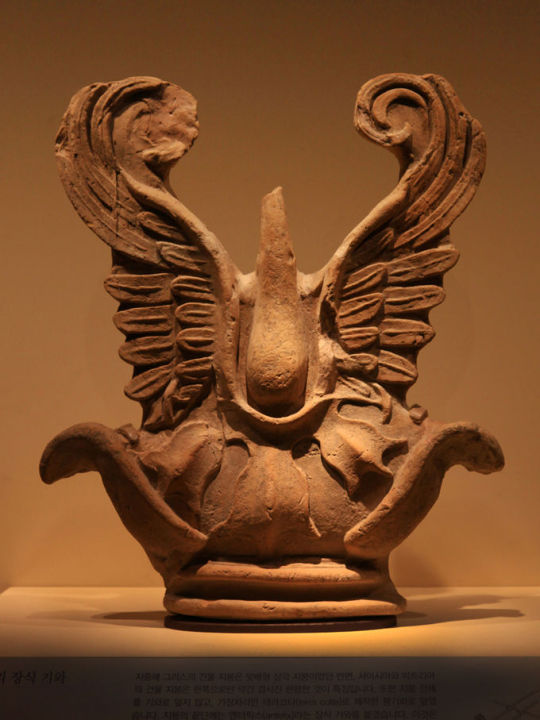


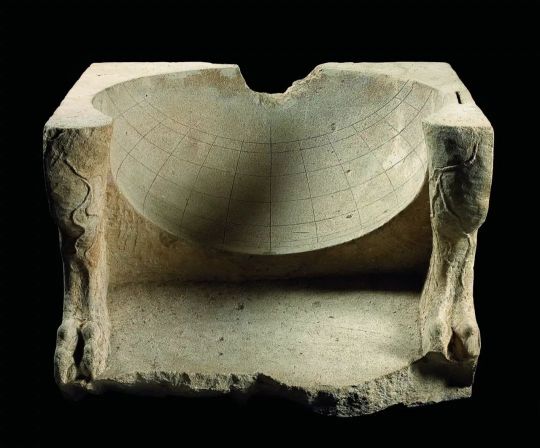
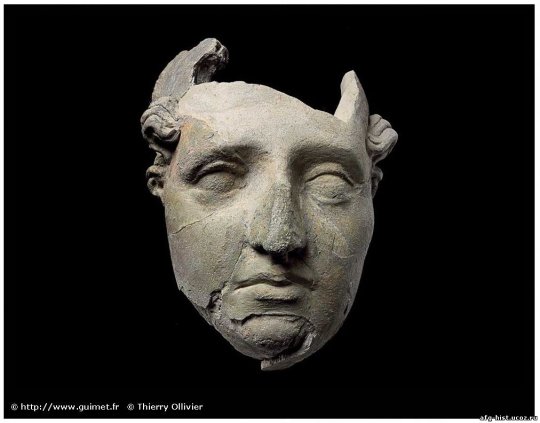
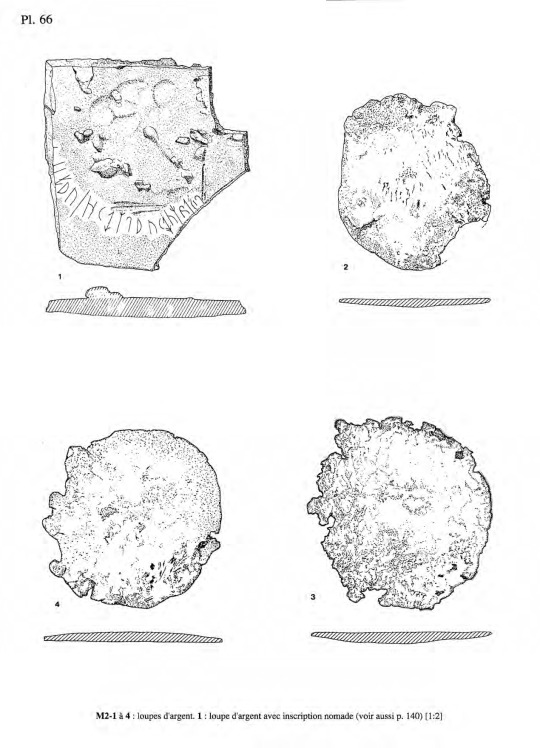
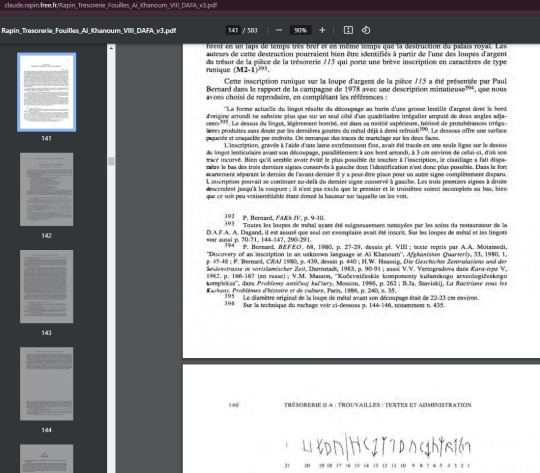
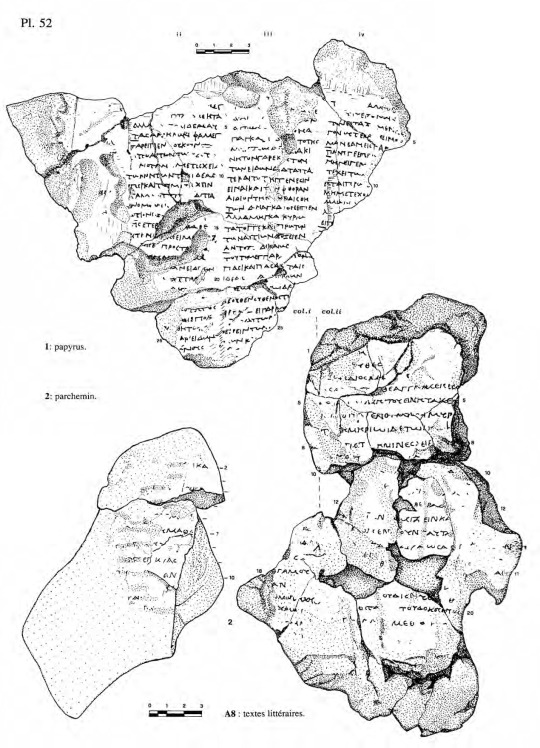
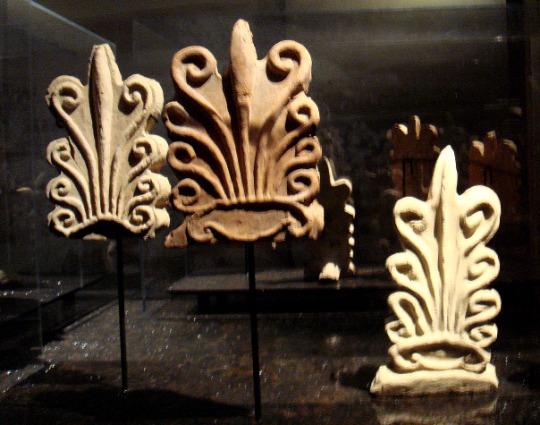

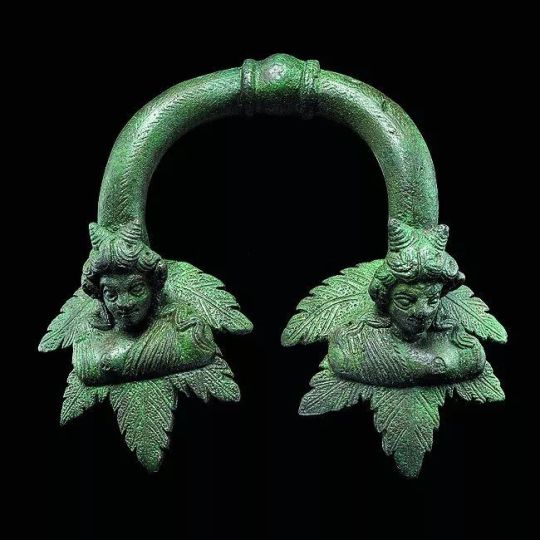


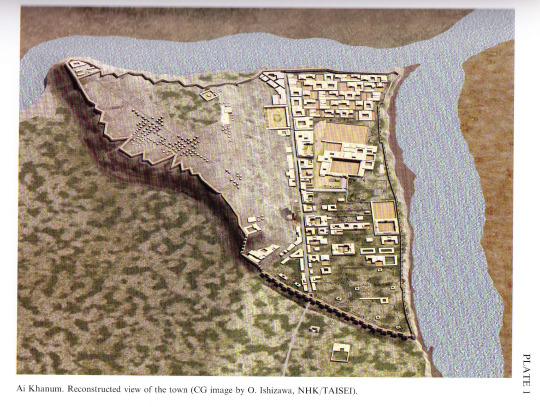
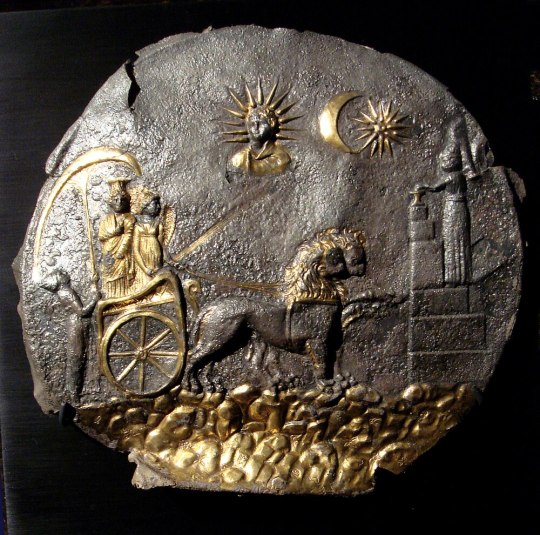

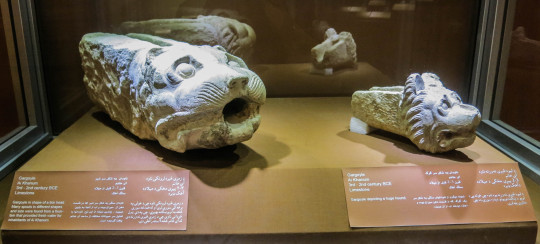

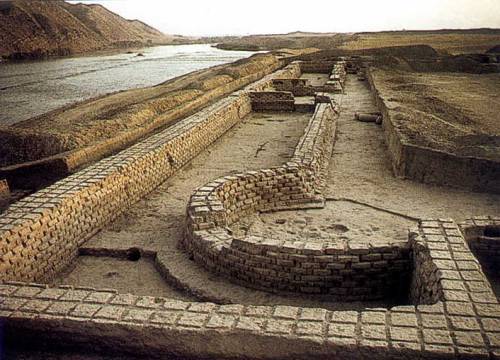


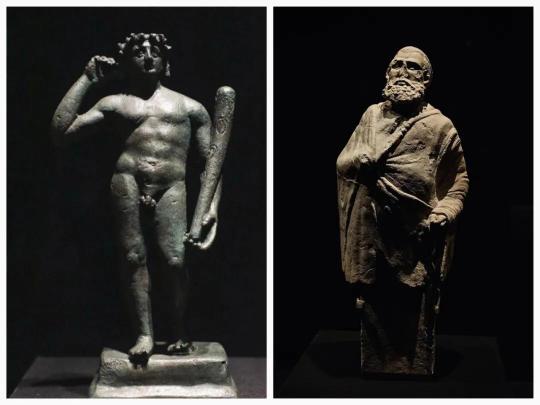
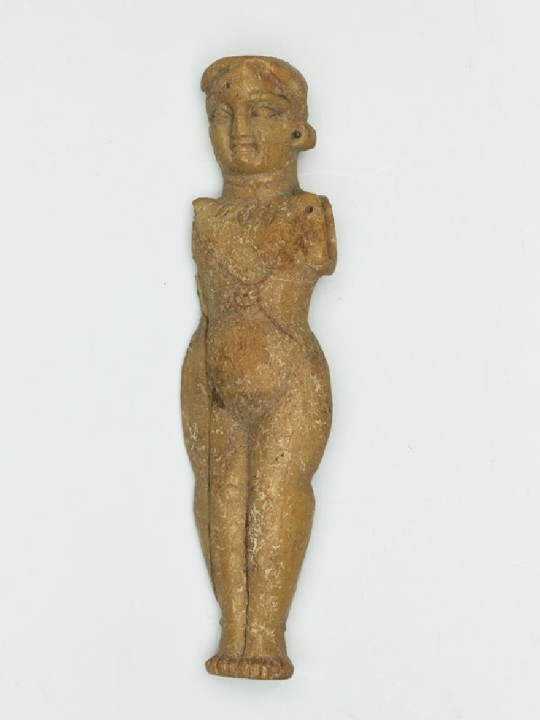





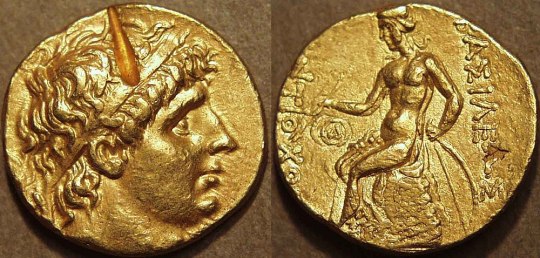

Ai Khanoum 3rd C. BCE - 2nd C. CE. More images on my blog, link at bottom.
"These wise sayings of men of old,
The words of famous men, are consecrated
At holy Delphi, where Klearchos copied them from carefully
To set them up, shining from afar, in the sanctuary of Kineas.
As a child, be well behaved;
As a young man, self-controlled;
In middle age, be just;
As an elder, be of good counsel;
And when you come to the end, be without grief.
—trans. of Ai Khanoum stele by Shane Wallace and Rachel Mairs.
Ai-Khanoum (/aɪ ˈhɑːnjuːm/, meaning Lady Moon; Uzbek Latin: Oyxonim) is the archaeological site of a Hellenistic city in Takhar Province, Afghanistan. The city, whose original name is unknown, was likely founded by an early ruler of the Seleucid Empire and served as a military and economic centre for the rulers of the Greco-Bactrian Kingdom until its destruction c. 145 BC. Rediscovered in 1961, the ruins of the city were excavated by a French team of archaeologists until the outbreak of conflict in Afghanistan in the late 1970s.
The city was probably founded between 300 and 285 BC by an official acting on the orders of Seleucus I Nicator or his son Antiochus I Soter, the first two rulers of the Seleucid dynasty. There is a possibility that the site was known to the earlier Achaemenid Empire, who established a small fort nearby. Ai-Khanoum was originally thought to have been a foundation of Alexander the Great, perhaps as Alexandria Oxiana, but this theory is now considered unlikely. Located at the confluence of the Amu Darya (a.k.a. Oxus) and Kokcha rivers, surrounded by well-irrigated farmland, the city itself was divided between a lower town and a 60-metre-high (200 ft) acropolis. Although not situated on a major trade route, Ai-Khanoum controlled access to both mining in the Hindu Kush and strategically important choke points. Extensive fortifications, which were continually maintained and improved, surrounded the city.
Many of the present ruins date from the time of Eucratides I, who substantially redeveloped the city and who may have renamed it Eucratideia, after himself. Soon after his death c. 145 BC, the Greco-Bactrian kingdom collapsed—Ai-Khanoum was captured by Saka invaders and was generally abandoned, although parts of the city were sporadically occupied until the 2nd century AD. Hellenistic culture in the region would persist longer only in the Indo-Greek kingdoms.
It is likely that Ai-Khanoum was already under attack by nomadic tribes when Eucratides was assassinated in around 144 BC. This invasion was probably carried out by Saka tribes driven south by the Yuezhi peoples, who in turn formed a second wave of invaders, in around 130 BC. The treasury complex shows signs of having been plundered in two assaults, fifteen years apart.
Although the first assault led to the end of Hellenistic rule in the city, Ai-Khanoum continued to be inhabited; it remains unknown whether this reoccupation was effected by Greco-Bactrian survivors or nomadic invaders. During this time, public buildings such as the palace and sanctuary were repurposed as residential dwellings and the city maintained some semblance of normality: some sort of authority, possibly cultish in origin, encouraged the inhabitants to reuse the raw building materials now freely available in the city for their own ends, whether for construction or trade. A silver ingot engraved with runic letters and buried in a treasury room provides support for the theory that the Saka occupied the city, with tombs containing typical nomadic grave goods also being dug into the acropolis and the gymnasium. The reoccupation of the city was soon terminated by a huge fire. It is unknown when the final occupants of Ai-Khanoum abandoned the city. The final signs of any habitation date from the 2nd century AD; by this time, more than 2.5 metres (8.2 ft) of earth had accumulated in the palace.
While on a hunting trip in 1961, the King of Afghanistan, Mohammed Zahir Shah, rediscovered the city. An archaeological delegation, led by Paul Bernard, unearthed the remains of a huge palace in the lower town, along with a large gymnasium, a theatre capable of holding 6,000 spectators, an arsenal, and two sanctuaries. Several inscriptions were found, along with coins, artefacts, and ceramics. The onset of the Soviet-Afghan War in the late 1970s halted scholarly progress and during the following conflicts in Afghanistan, the site was extensively looted."
-taken from Wikipedia
...
"The silver ingot engraved with runic characters found during the excavations of the Treasury could suggest they were Sakā/Sai. This inscription comprises 21 characters of a script and a language that are unknown and both attributed to nomadic people of Sakā origin, by comparison with a dozen similar inscriptions coming from an area extending from Ghazni in Afghanistan to Almaty in Kazakhstan, and dated between the 5th century BC and the 8th century AD."
-taken from Ai Khanoum after 145 BC: The Post-Palatial Occupation by Laurianne Martinez-Sève, University of Lille, 2018
#ancient history#antiquities#art#paganism#statue#museums#sculpture#history#greek art#greek gods#ancient greek#greek myth#scythian#pagan#ancient art#afghanistan
187 notes
·
View notes
Photo
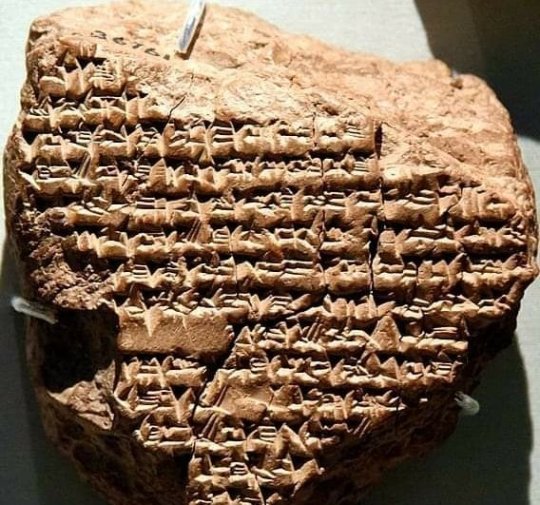
Babylonian Cuneiform Tablet; accounts of Alexander's victory over the last Achaemenid king Darius III at the battle of Gaugamela on 1 October 331 BC, and his triumphant entry into Babylon (modern, Iraq)
337 notes
·
View notes
Text


Battle of Salamis by Wilhelm von Kaulbach
#battle of salamis#naval battle#ancient#art#greece#greek#greek city states#achaemenid empire#persian empire#salamis#themistocles#king xerxes#eurybiades#artemisia#ariabignes#tetramnestos#achaemenes#damasithymos#xerxes#artemisia i of caria#xerxes i of persia#persia#persian#athenian#spartan#history#europe#mediterranean
39 notes
·
View notes
Text
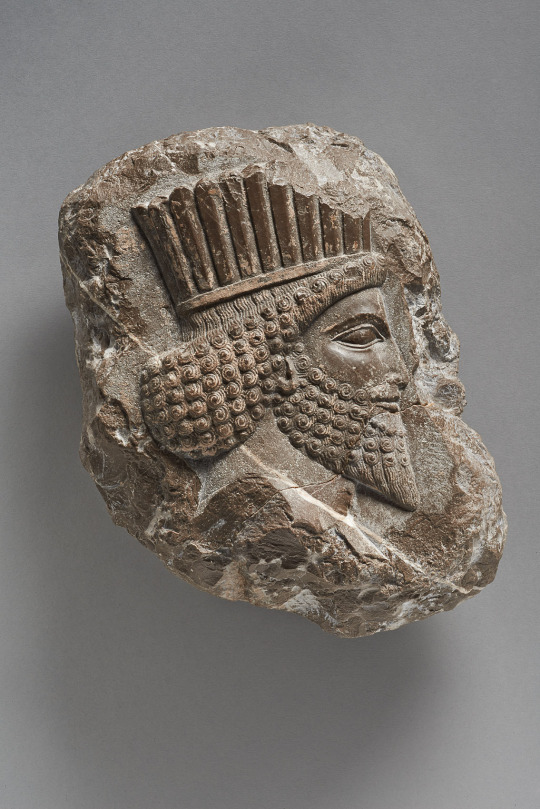

~ Relief fragment with the head of a Persian nobleman.
Culture: Persian
Period: Achaemenid period
Date: Time of King Darius, 522-486 B.C.
Place of origin: Persepolis , Iran
Medium: Limestone, grey
#ancient#ancient art#history#museum#archeology#archaeology#fragment#persia#persian#achaemenid empire#relief#persian nobleman#Persepolis#iran#king darius#552 b.c.#486 b.c.
525 notes
·
View notes
Photo
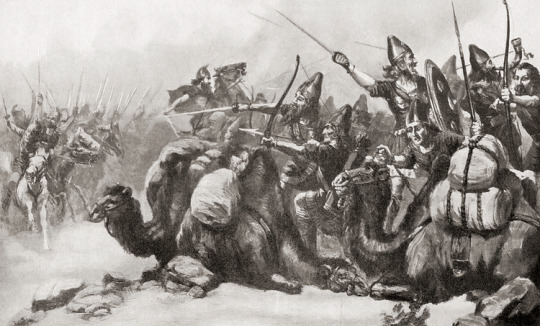
Battle of Thymbra
The Battle of Thymbra (547 BCE) was the decisive engagement between Cyrus II (the Great, r. c. 550-530 BCE) of Persia and Croesus (r. 560-546 BCE), King of Lydia. The Persian victory ended the Kingdom of Lydia, which was then absorbed into the Persian empire, and enabled Cyrus to expand his territories and fully establish the Achaemenid Empire.
Croesus had arranged the marriage of his sister, Aryenis, to the king of the Medes, Astyages (r. 585-550 BCE), and maintained a cordial relationship with the Median kingdom, agreeing on the Halys River as the border between their territories. When Cyrus overthrew Astyages in c. 550 BCE, Croesus saw an opportunity to enrich himself while protecting his kingdom against possible Persian aggression and so launched a military campaign across the Halys.
An inconclusive battle was fought between the armies of Croesus and Cyrus at Pteria, and Croesus then retreated to his capital city of Sardis where he disbanded much of his army for the winter season, as was customary, and expected Cyrus to do the same. According to Xenophon (l. 430-c. 354 BCE), Cyrus was advised to follow suit by his advisers but chose instead to press on to an attack, marching on Sardis and meeting Croesus on the field of Thymbra.
Cyrus dispersed the Lydian cavalry by placing camels at the front of his army, which frightened the Lydians’ horses, and then drove his own cavalry through the breaks in the ranks, defeating Croesus and driving him back into the city. After a fourteen-day siege, Sardis fell, and Croesus was captured.
The battle is often cited as one of the most important in history as it put an end to Lydia, previously the richest and most powerful kingdom in Asia Minor, which was allied with Babylon. Once Lydia was conquered, Cyrus was able to take Babylon by 539 BCE, bringing Mesopotamia under Persian control, and founding the Achaemenid Empire.
Sources & Strengths
The main sources on the battle are the Greek writers Herodotus (l. c. 484-425/413 BCE) and Xenophon though the fall of Sardis under Croesus is also addressed by Ctesias (l. 5th century BCE). Herodotus’ account in his Histories I.79-81 and I.84 is considered accurate while Xenophon’s, from his Cyropaedia (The Education of Cyrus, 2.1.6 and 7.1.23-28) is understood as a semi-fictionalized account based on earlier works. Xenophon’s account is still recognized as reliable at points although the numbers he gives for the armies have been challenged.
According to Xenophon, Cyrus was vastly outnumbered at Thymbra, leading 200,000 men against Croesus’ army of 420,000. It is more likely that Cyrus had between 20,000-50,000 and Croesus, even though he had sent home his mercenaries, twice that number, possibly over 100,000.
The Persian army was made up primarily of Persians with mercenaries from Armenia, Arabia, and Media and included infantry, cavalry, camel cavalry (seemingly a last-minute decision on Cyrus’ part), archers, slingers, 300 war chariots, and at least five siege towers. The Lydian army consisted of Lydian cavalry as well as infantry mercenaries from Babylon, Cappadocia, Egypt, and Phrygia. Croesus also had archers, slingers, and around 300 war chariots.
Continue reading...
41 notes
·
View notes
Text
Persian Capitals and Roving Kingship
4. Does Arrian's record mean that Alexander hadn't been on official business for two months or so because of his mourning? Was it also because of mourning that he didn't leave Ecbatana until the winter, or it's because he was resting his army? 5.(not question) I just want to say that I really love your Kampaspe and Kleopatra and really hope to see them more!!! They were both very attractive and, in my opinion, quite rational, unlike many of the stereotypes of women that still exist in literature today. Thank you very much
First, thank you, for #5. I really wanted to present a more (to my mind) realistic view of women in ancient Macedonia, including their own agency.
And yes, both Kampaspe and Kleopatra have major roles going forward.
As for #4, I’m not entirely sure what record in Arrian you mean? But Alexander had gone to Ekbatana for “down time,” to rest his army and provide games, as he did periodically on campaign.
The Persian kings already had a tradition of a mobile court, and three/four capitals.
Persepolis/Parsagadai was largely religious and ceremonial. Kings went there for particular rites and, of course, to be crowned. Otherwise, it wasn’t a proper city, with only a skeleton crew when the king wasn’t in residence.
Susa was the old capital of a Bronze Age empire, taken over by the Persians, and it became the administrative capital of their empire with current records and treasury, whereas Persepolis was largely an archive plus additional treasury. Thus when ATG captured both, he controlled enormous funds.
Ekbatana was the traditional capital of the Medes (cousins to the Persians). So when Cyrus conjoined the two peoples and conquered what would become the Persian empire, he set up a tradition of “roving” king and capital. Hence that ginormous tent ATG captured after the Battle of Issos was effectively a mobile throne room/palace.
Cyrus also added Babylon, the “New York” or “Paris” if you will, of the ancient near east. Culturally, it was distinct, not Persian, but it became a defacto 4th capital. Ergo, when Alexander conquered it all, it made a certain sense for him to choose Babylon as his new capital, rather than continue one of the Persian capitals. It signified a shift in ethnic leadership.
So, Persian kings moved around. They wintered in Susa (and Babylon), then summered in Ekbatana, due to the heat (and mosquitoes) on the rivers. Ekbatana was a better climate, on the piedmont. So that’s why ATG went up there, although he did so rather late in the season, arriving at the end of summer. Hephaistion’s death probably delayed his return south, but it wouldn’t be typical for a Persian king to winter in Ekbatana, if not necessary. It’s cold.
Of course, Alexander didn’t intend to stay in Asia that long anyway, so these usual patterns of movement wouldn’t have applied much to him. Nonetheless, that’s why he left Ekbatana as winter set in. If anything, he was late on the move back to Babylon/Susa.
#asks#Persian capitals#Achaemenid King's Progress#Ecbatana#Susa#Persepolis#Babylon#Alexander the Great
6 notes
·
View notes
Text
So, this is gonna be a bit of a read, but I thought of a little AU idea and I kind of wrote a mock Prologue for it???
(yes I drew little doodles for it. End me lol)


Since it's set back in time when Xerxes was still a bustling empire, I figured Amestris would be in the 15th century of sorts. (Yes I know Amestris wasn't even made yet, but in this Medieval/Xerxes AU it is!)
Cause I looked into it and figured out Xerxes fell around 1480 or so?? So we're going with medieval Amestris.
It starts out with the trio being young (like 6 and 5 years of age) just so you have an idea.
So if y'all wouldn't mind taking a moment to read this little (3000?) Word excerpt I created out of my ass today, that would be awesome! Not promising it's in character or good 🤣👌🏽
TITLE: Achaemenid
PROLOGUE
Xerxes, a stand alone empire betwixt Xing and Amestris. No one dared challenge or overthrow this stretch of desert as a result of its King. He was ruthless and heartless at times. Yet Communicable and selfless at others. Alongside his majesty stilling the hearts of his enemies, no one particularly wanted such a vast wasteland. Nor could they grasp why an empire rose within the center of it.
The air surrounding Xerxes, upon approaching, was different somehow. No one could place it. All who came to the border of Xerxian territory felt as though something had passed through them or vice versa. The conspicuous distinction in the clearity of the desert sky on the other side of this “border” felt unnerving yet reassuring. At least the air looked sand free the closer the caravan trudged to their destination. The only effective means of travel in the desert was by camel back. Any other means was surely suicide.
“Are thee thirsty?”
The traveling company consisted of four camels, but five riders. Three were knights, bequeathed the honour of smuggling the remaining Rockbell family line from further extinction. They had been labeled traitors in their home country, Amestris. Despite being but a lowly old hag and orphaned child, the Queen wanted blood for crimes they had not committed. Someone on the inside, took action and fabricated the plan to get them to safety before the Queen decreed their sentence.
“Drink, before thy self run dry.”
The knight’s clothed arm held steady in front of Pinako Rockbell. She huffed a thank you, her aggravation more towards the scorching heat than him. After taking a drink herself, she gave the rest to Winry Rockbell, who sat in her lap.
“Drink child.”
Winry took the flask in her tiny hands, touching it to her lips and tilted it back. Finishing with a gasp of air, she felt much better. But a refreshing drink of water did nothing to wash away the fact that her parents were dead and are perceived to be traitors. She knew, without a doubt, that they were most certainly not. She wanted to cry again, but recalled granny telling her to conserve her fluids. This journey had been longer than she anticipated.
Finally coming across life of some kind, the caravan ventured across a bridge stretching over an irrigation system that seemed to go for miles in opposite directions. There were people actively digging the system down below. Hearing hooves shuffle across the stone, a handful of them turned to look up.
Winry ducked her head to escape their gaze, but soon was in awe of their odd features. Each and every one of them had gold hair that varied in shades. But what really caught her attention were the array of amber gold eyes staring her way. They varied in intensity as well, but each was piercing in their own right. She couldn't look away. After staring a moment, the people began to wave an arm in greeting in unison, smiles on their faces. They were oddly friendly to strangers. The people down below disappeared over the hump of the bridge once they crossed it and made it back to land, moreso sand.
The knight's accompanying them steered their herd towards a stable like building meant for housing the camels of travelers for their later departure. Except, they weren't leaving anytime soon, Winry thought. The knight's would leave them behind to burn under the hot sun. Although, now that they were in town, the sun didn't seem that bad anymore, but it still weighed on them.
Given Granny’s and Winry's size, the knights had to help them down off of the towering camels safely. Granny didn't like a grown man touching her, but she figured it would be best not to complain. They did all this for them. She took Winry's hand since she didn't feel safe in a foreign land whatsoever.
“Stay by my side, Winry.”
Winry noded and hid behind her as they walked down the center of the shopping district. A perfect place to attract travelers for money. Everyone they passed seemed to be happy to see them or at least friendly. Some would talk to each other and watch them pass. Granny didn't like being on display like this, she squeezed Winry's hand.
It felt like ages, but they finally walked to the center of the empire and scaled the thousands of stairs it took to get to the throne room. Winry wanted to slap this King or whatever. No one would want to come here and climb a mountain of stairs just for a King.
Once they basked in the vast throne room, the knights turned to Granny.
“Ma’am, the lass need not pay the King audience. Only thee must accompany us.” The knight speaking bowed, but Granny didn't like this idea.
“I'm not leaving her alone. She comes with me.”
“Ma’am…the King wouldn't-”
He was cut off by a tall young man, sporting a blonde beard and hair pulled back in a ponytail. “If I may?”
Pinako looked over and up to glare at whoever else wanted to take Winry from her. “Who are you? I'm not leaving her.”
The man put up his hands in surrender. He didn't take being yelled at very well. “I mean no harm, ma’am. Id like to suggest taking your…..granddaughter for the time being. I have two boys of my own she could distract herself with. I'm sure your conversation with the King will be short and sweet.”
“Like hell you think im-”
“Please please. I promise no harm will come to her. The King doesn't like children in his throne room. She would just upset him. Me on the other hand, I love them. She'll be safe with me.” He gave a pause and looked Pinako in the eyes, putting his hands together in a prayer form. “I promise.”
Pinako didn't care how many times he repeated himself, she didn't like this at all. Leaving her only granddaughter with a random stranger did not sit well with her.
The knight cut in this time. “Make haste, the King doesnt take nicely to waiting.”
“Alright alright. Fine. Get off my back will ya!” Pinako grumbled, turning to Winry. She grabbed both of Winry's hands this time and squeezed. “Winry. I don't want to do this, but you're going to be spending some time with that man there. I'll be back as soon as I can, okay?”
Winry nods. “Okay, Granny.” She looked to the blonde man smiling down at her. He wasn't unnerving or creepy. He looked really sweet and nice. He held his hand out and looked from Winry to Pinako.
“I will take good care of her for you. She'll have fun with my boys, I know it. Come come.”
Winry slowly took his hand and let go of Pinako’s. Neither looking like they wanted to go anywhere. Winry watched Granny go through the big double doors and disappear. She'd be lying if she wasn't worried now.
“Oh where are my manners,” the man smiled down at her while walking her down a corridor. “My name is Von Hohenhiem. What’s-”
“Winry.”
Her sudden response gave him pause, but Hohenhiem smiled anyway. “I know this is stressful and scary, but I promise you'll be just fine. There's nothing to fear now. Through here.”
He guided her through an archway, pushing aside fabric in the way to reveal what looked to be a library with an open floor in the center.
“Boys! We have company.”
No response. He smiles nervously down at Winry. Clearing his throat he tried again.
“Edward! Alphonse!”
He was complimented by a grumble and shuffling of books falling over.
“I'm coming! I'm coming! I was just getting to a good part!”
A moment later, a boy appeared from around a bookshelf, not looking happy to be disturbed. He wore robes like his father with red trim. His hair short in the back, but long in the front, most of it covering the sides of his face. He blinked, seeming disturbed by Winry, obviously not expecting someone else. Turning to look back he sighed.
“Come on Al.”
Another boy poked his head out, hiding behind his brother. Much more shy than the first one. He also wore a robe like his brother, but with blue trim.
As they stepped closer to her, Winry got a closer look at their golden features. She could make out more detail compared to the people under the bridge. These two boys sported the most brilliant golden eyes out of all the eyes she's seen on the way in here. She couldn't help but stare.
“Winry. These are my boys. The one with the sour expression is Edward. The one hiding is Alphonse. Now, I have some work to do for the King. Play nice boys. Don't make her cry.” Hohenhiem looks from Al to Ed. “Edward.”
The boy named Edward had obviously taken offense to this.
“Wha- I haven't done anything yet!” Crossing his arms he looks at Winry, but it looks more like a glare.
“Be nice, I'll let you know when your granny is ready for you, Winry dear.”
Winry nods, watching him leave as the fabric falls back in the doorway, she turns back to Ed and Al.
Collectively, they all stare at each other. Winry couldn't help but notice Al still hiding behind his brother.
“Umm….” Winry started, but Ed cut her off.
“Sooo, Winry huh? What do you wanna do then? All we have are books and some toys. Not much though. We're just slaves after all…” Ed huffs, lowering his arms and resting them on his hips.
“Slaves?” Winry looked worried.
“Yeah, slaves.” He tilted it head at her, his golden hair falling in his face a bit. “Don't you have those where you're from?”
“But you all look the same…”
Edward cocked an eyebrow. “What does that have to do with it? Only the alchemists live well here.” He shrugged but put on a proud smile and pointed at himself with his thumb, puffing his chest out. “Soon we'll be skilled alchemists and surpass those losers!”
Al spoke up for the first time from behind Ed, pushing down on his left shoulder. “Brother-” He hissed at him. “Don't say that out loud, they might hear you….”
“Whatever, Al, it won't matter when we're out of here!” Ed absolutely beamed at his brother.
“Al…chemists?” Winry blinked, completely dumbfounded. “What in the world is that?”
Ed and Al turned their heads and looked at her in unison. Almost in sync. “You don't know what Alchemy is?” They even spoke in unison too.
Winry shook her head, her hair swishing in her face.
Ed looked at Al and Al looked at Ed. They smiled and looked back to Winry. They bursted with energy at her and grabbed both her hands, she almost ran out of the room.
“Come on!”
“We’ll show you!”
Yanking her into the room’s center, there was a carpet lain out for play. They let go of her and ran in random directions, searching through books and scrolls. Winry opted to stand on the very edge of the carpet, deciding to keep her distance. Both boys looked like they wanted to show her a new strange rock they found in the forest or something of the like.
Edward emerged first carrying a scroll and chalk sticks. Alphonse had bottles and jars of unknown substances. Winry was more curious now. If they were this interested in something like this, whatever it was, it must be cool.
Ed rolled up the carpet aggressively and chucked it aside. Holding open a scroll, he read off of it and began drawing lines on the stone floor. Winry was confused now. Was this Alchemy? Drawing on the floors in chalk?
As Ed finished, it was clear to Winry that it was a giant circle with triangles and writing she couldn't understand.
“What-?”
Edward tisked. “Not done yet.”
Winry shut her mouth.
Al gave him a few jars of….stuff and they both opened them and poured out the contents in the center.
“Now the material.”
“Ready?”
They got down to their knees and smiled at each other at opposite sides of the circle.
“Ready.”
A few moments went by, nothing. Winey was about to say something again when the chalk started to glow. She couldnt believe her eyes, her mouth fell open. What felt like wind was circling around the outer circle. Lights and sparks erupted from the center and triangles. The light was everywhere. The boys didn't seem bothered by this at all, they were smiling down at the pile of material they offered to the center and waited.
As the light show continued, the pile started moving. Winry's eyes grew wider. It started taking the shape of a….doll head.
That's when it got terrifying.
The doll head wiggled it's way out of the pile along with a body attached. As it formed the facial features, it looks like something out of a nightmare.
Winry started to whine. But the boys didn't stop until they heard her wail.
They whipped their heads around with worry plastered on their faces. Winry was slouched on the ground crying and rubbing her eyes. Trying to get rid of the sight that bore into her eyes. She heard their footsteps and felt their hands on her arms. Trying to get her to stop crying.
“Winry! Winry! It's okay!” Alphonse was pleading with her, holding her forearm and touching her shoulder. Edward didn't know what to do. He's only ever consoled a crying Al, but that's different than a girl crying. He just hovered and looked ashamed and lost.
When the boys got her to a hiccup, she finally took her head out of her hands and looked at them in front of her. The worry was very real on their faces. They bowed their heads and slumped.
“We're sorry…”
“We didn't know it would scare you…”
Winry hiccupped, but looked over Ed's shoulder to see a fully formed, not scary, doll sitting at the center of the circle. She looked back to sets of golden eyes looking at her. One of them looked like they were about to cry too. She smiled a little. They were only trying to show her something and make her happy.
She was about to ask if she could have the doll when Hohenhiem whipped the fabric at the doorway open.
“I heard crying! Edward, what did you do??”
The remorse on Ed's face was gone in a flash. He jumped up and huffed, stomping his feet.
“I didn't do nothing!”
Hohenhiem scanned the tosseled rug and the obvious circle drawn on the floor. He slouched and sighed, pinching his nose.
“Did you scare her with Alchemy?”
Ed crossed his arms and turned away, puffing out his cheek. “No….”
Al stood up and gripped his robes. “Yes…” Ed whipped around and opened his arms at Al in a ‘are you serious?’ manner. Sour for being ratted on.
Hohenhiem sighed again. “I'm sorry Winry. I didn't think these two were going to immediately give you nightmares as soon as I left them alone with you. I should've known…”
Ed huffed again. “What's that supposed to mean??”
Winry’s eyes whipped from one to another. Amazed by the life in the room. Silently getting up while the other two argued, she tentatively picked up the doll and inspected it. Al quietly tapped her shoulder and smiled when she looked over.
“You can have that if you want it. It won't fall apart. It's really a real doll.” He smiled soft and sweet. “We made it just for you.”
She didn't know what would come of her life here in Xerxes now that she was stuck here for the foreseeable future, but with these two around, she knows it'll be interesting at least.
“Thanks, Al.”
#fma#fullmetal alchemist#edward elric#winry rockbell#alphonse elric#my writings#fmab#medieval au#medieval amestria au??#xerxes au#van hohenheim#prologue#achaemenid#xerxian#i dont know how to tag this lol#i tried okay??#i literally wrote this in one night#i hope its decent#i think its okay but 🤷🏽♂️#yes i want you know over and over that the xerxian children have GOLDEN hair and GOLDEN eyes#pinako rockbell#kings and knights#king xerxes#king of xerxes#now in just adding any random key work tags i can lol#edwin#ed/win
73 notes
·
View notes